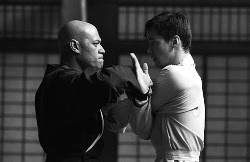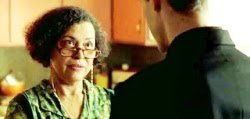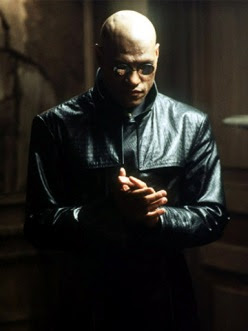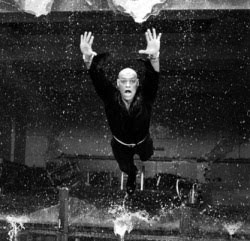Stage 1, Call to Adventure = Meeting Trinity, who offers the answer to the question "What is the Matrix?"
Stage 2, Refusal of the Call = Threatening to leave the car that will deliver him to Morpheus just because Switch wants Neo to lift his shirt
Stage 3, Supernatural Aid and Amulet = Morpheus and his red pill
Stage 4, Crossing of the First Threshold = Waking up in a goo-filled pod
Stage 5, Belly of the Whale = Getting swallowed into the steel belly of the Nebuchadnezzar
Initiation, Stage 6: Road of Trials
To survive the Great Unknown, the hero must acquire new mental and physical skills. Campbell says that the hero must set aside everything he knows from his old life to "bow and submit to the absolutely intolerable" that is coming. As the hero accomplishes a series of difficult tasks, he learns to navigate the new world where he now travels.
One of the best movie scenes to illustrate Road of Trials is the harsh tutelage of Mr. Miyagi in The Karate Kid. Daniel has left his old life, which included half-assed YMCA lessons and martial arts instruction from library books, to enter the world of organized championships where he must battle the gang of karate Nazis who are terrorizing him at school. A little too gleeful about becoming Mr. Miyagi's student, Daniel discovers that he must submit to arduous, glamorless chores like washing and waxing Mr. Miyagi's impressive collection of cars, painting the fence that surrounds his teacher's huge yard, sanding the decks, and painting the house. "You karate training!" Mr. Miyagi affirms whenever Daniel complains, so the poor boy continues to tolerate being an unpaid, barely recognized slave. When the frustrated Daniel announces that he is about to quit, Mr. Miyagi demonstrates that all of the back-breaking labor has allowed Daniel to burn into muscle memory several key defense skills that he can use to ward off an attack.
 In The Matrix, Neo must also learn several things about his new existence. In the leather chair pow-wow with Morpheus, when Neo is first "re-plugged," he learns the truth about human history, that machines control the planet. After combat training downloads, Neo attempts to transcend his preconceptions about gravity and muscle strength during his fight with Morpheus and his first attempt jumping rooftops. The Agent-training program introduces Neo to the habits and dangers of the sentient programs who patrol the Matrix. When squiddies attack the Nebuchadnezzar, Neo discovers that his new life is dangerous whether he is "plugged in" or not. And the alcohol-loosened conversation with Cypher teaches Neo that not all "free" humans are happy. All of these lessons give Neo some familiarity with his new reality.
In The Matrix, Neo must also learn several things about his new existence. In the leather chair pow-wow with Morpheus, when Neo is first "re-plugged," he learns the truth about human history, that machines control the planet. After combat training downloads, Neo attempts to transcend his preconceptions about gravity and muscle strength during his fight with Morpheus and his first attempt jumping rooftops. The Agent-training program introduces Neo to the habits and dangers of the sentient programs who patrol the Matrix. When squiddies attack the Nebuchadnezzar, Neo discovers that his new life is dangerous whether he is "plugged in" or not. And the alcohol-loosened conversation with Cypher teaches Neo that not all "free" humans are happy. All of these lessons give Neo some familiarity with his new reality.Initiation, Stage 7: Meeting with the Goddess
Having acquired enough survival skills for his new realm, the hero must "meet the goddess." In The Matrix, Morpheus decides that Neo is ready to visit the Oracle, and my students always jump on that scene in the movie to satisfy the stage. Unfortunately, the Oracle makes a better "woman as temptress," the following encounter, so meeting with the goddess has to occur before the Oracle.
Campbell describes the stage like this: "[The goddess] guides, she bids [the hero to] burst his fetters." Because the hero cycle is a path of change, a birth into a more mature existence, I believe that Campbell here means that the Goddess gives the hero some piece of advice instrumental in attaining the higher level of consciousness. If the Oracle doesn't provide this advice, who does? Who "guides" Neo? Who gives Neo the insight he needs to "burst his fetters"?
I would argue that Spoon Child does.
 Campbell says that the goddess appears in a manner the hero can understand: "In the slow initiation which is life, the form of the goddess undergoes ... a series of transfigurations." At this point in his life, Neo has problems with authority. As a hacker in his old life, he flaunted laws. His day-job boss tells him straight out, "You have a problem with authority, Mr. Anderson. You believe that ... somehow the rules do not apply to you." Despite their ability to hold him in custody, Neo gives the finger to the "criminal investigators" who arrest him at work. An old, wise woman isn't the type of goddess Neo will listen to; mother-like, influential, resplendent with the awe and respect other characters like Morpheus and Trinity give her, the Oracle is someone for Neo to resist, especially since she can bind someone with the shackles of Fate. An innocent child, however, one too young to understand class or prestige or societal conventions, is exactly the person Neo would hear.
Campbell says that the goddess appears in a manner the hero can understand: "In the slow initiation which is life, the form of the goddess undergoes ... a series of transfigurations." At this point in his life, Neo has problems with authority. As a hacker in his old life, he flaunted laws. His day-job boss tells him straight out, "You have a problem with authority, Mr. Anderson. You believe that ... somehow the rules do not apply to you." Despite their ability to hold him in custody, Neo gives the finger to the "criminal investigators" who arrest him at work. An old, wise woman isn't the type of goddess Neo will listen to; mother-like, influential, resplendent with the awe and respect other characters like Morpheus and Trinity give her, the Oracle is someone for Neo to resist, especially since she can bind someone with the shackles of Fate. An innocent child, however, one too young to understand class or prestige or societal conventions, is exactly the person Neo would hear.And who can say for certain that Spoon Child is male or female? Clothing and hair style don't indicate a boy or a girl. Puberty hasn't yet given away gender in the voice.
What Spoon Child does is implant the idea that nothing in the Matrix has true substance—"There is no spoon." Even if Neo can still see something, hear it, touch, taste or smell it, no item, no person, is really there. Whatever one "bends" is himself, says Spoon Child, giving the mind of the person all of the power, not his sense perceptions. As Descartes so simply noted, "I think; therefore, I am." Identity remains even when the senses are mistaken or unavailable. Once Neo internalizes this insight, he is able to stop bullets in midair, to master the Matrix. And it is this child, not the Oracle, who imparts the important insight.
Initiation, Stage 8: Woman as Temptress
Campbell believes that "woman" is the "great symbol of life," especially for "the acts of life, the organs of life," i.e., physical and material temptations such as filling the stomach, sleeping in a warm bed, and satisfying sexual urges. In this stage of the cycle, a woman appeals to the flesh and its needs in an attempt to divert the hero from his otherwise spiritual journey of growth.
 Although the Oracle does not have—for Neo anyway—"loins of irresistible attraction and breasts bursting to be touched," she does have that warm, friendly kitchen and an oven full of baking cookies, items that appeal to a different organ than the penis. When she tells Neo that he isn't "the One," a look of relief crosses his face. He didn't want that responsibility any more than he wanted his old day job in the Matrix. The Oracle convinces him to leave the path, as any good temptress should do.
Although the Oracle does not have—for Neo anyway—"loins of irresistible attraction and breasts bursting to be touched," she does have that warm, friendly kitchen and an oven full of baking cookies, items that appeal to a different organ than the penis. When she tells Neo that he isn't "the One," a look of relief crosses his face. He didn't want that responsibility any more than he wanted his old day job in the Matrix. The Oracle convinces him to leave the path, as any good temptress should do.Initiation, Stage 9: Atonement with the Father
Campbell claims that "the ogre aspect of the father is a reflex of the [hero's] own ego." I explain the stage to students like this: A father—either biological or a strong male presence—exists in the hero's life. At the beginning of the cycle, the hero believes that he and the father are significantly different. The best film example is the Star Wars series. Luke Skywalker believes that he is incapable of corruption, but once he becomes angry enough during a light sabre fight with Darth Vader, his biological father, he himself feels the call of the powerful dark side of the Force and understands that he too has the potential to change allegiance. This understanding of the similar nature between the "son" and the "father" is the "at-one-ment" that Campbell explains for this stage.
 Morpheus is, of course, Neo's father figure. Unlike Darth Vader, Morpheus symbolizes positive qualities: leadership, commitment, the ability to follow through. These qualities are antithetical to Neo at the beginning of the movie. He is a mere drone at his day-job; there is no evidence that he has family or close friends who require his presence, let alone his loyalty. Since he distrusts everyone and everything, there is no point in pursuing a single course of action. Neo might like and respect Morpheus, but he does not believe he can become a man like Morpheus.
Morpheus is, of course, Neo's father figure. Unlike Darth Vader, Morpheus symbolizes positive qualities: leadership, commitment, the ability to follow through. These qualities are antithetical to Neo at the beginning of the movie. He is a mere drone at his day-job; there is no evidence that he has family or close friends who require his presence, let alone his loyalty. Since he distrusts everyone and everything, there is no point in pursuing a single course of action. Neo might like and respect Morpheus, but he does not believe he can become a man like Morpheus.Neo's "at-one-ment" with his "father" arrives after Morpheus has sacrificed himself, allowing his own capture by the Agents, so that Neo can escape. Trinity and Tank are about to pull Morpheus' plug aboard the Nebuchadnezzar so that the Agents cannot break into their leader's mind to steal the access codes to Zion. Neo stops them [an act of leadership] and decides to rescue Morpheus, a feat never before attempted [an act of commitment that will require follow-through]. To save Morpheus' life, Neo must call on the same qualities that Morpheus has consistently demonstrated, qualities that Neo did not realize he could actualize.
Initiation, Stage 10: Apotheosis
 A hero who goes "beyond the last terrors of ignorance" will, claims Campbell, become "godlike." When Neo returns to the Matrix to rescue Morpheus from the Agents, we see a changed man. He is confident and knows what he must accomplish. He can formulate a plan of action and execute it. He is no longer hampered by doubt, lack of knowledge, or insecurities. We watch Trinity and Neo blast their way into a maximum-security building, disabling and disarming the heavily armed guards as if they were cardboard cut-outs instead of highly trained militia. If reporters rushed to the scene afterwards and interviewed survivors, I'm sure that the men who battled Trinity and Neo would claim that superhumans had caused the death and destruction.
A hero who goes "beyond the last terrors of ignorance" will, claims Campbell, become "godlike." When Neo returns to the Matrix to rescue Morpheus from the Agents, we see a changed man. He is confident and knows what he must accomplish. He can formulate a plan of action and execute it. He is no longer hampered by doubt, lack of knowledge, or insecurities. We watch Trinity and Neo blast their way into a maximum-security building, disabling and disarming the heavily armed guards as if they were cardboard cut-outs instead of highly trained militia. If reporters rushed to the scene afterwards and interviewed survivors, I'm sure that the men who battled Trinity and Neo would claim that superhumans had caused the death and destruction. Compare the Neo at this stage of the movie to the Neo still hooked in the Matrix and working his day job. When the Agents arrive to arrest that Neo, he looks like a scared prairie dog who has scented a wolf or mountain lion. He pokes up his head, hoping nothing will snatch him from the sky. He scurries from one cubicle to the other just like a frightened animal and cannot reason an escape once he realizes he is trapped. That Neo, the old Thomas Anderson, no longer exists, replaced instead by the more evolved being who has successfully navigated many of the stages of the hero cycle.
Compare the Neo at this stage of the movie to the Neo still hooked in the Matrix and working his day job. When the Agents arrive to arrest that Neo, he looks like a scared prairie dog who has scented a wolf or mountain lion. He pokes up his head, hoping nothing will snatch him from the sky. He scurries from one cubicle to the other just like a frightened animal and cannot reason an escape once he realizes he is trapped. That Neo, the old Thomas Anderson, no longer exists, replaced instead by the more evolved being who has successfully navigated many of the stages of the hero cycle.Initiation, Stage 11: The Ultimate Boon
 The Ultimate Boon is such a difficult task that before the adventure, the hero would not have had success. Now, however, the hero accomplishes the task with "no delaying obstacle and makes no mistake." Orchestrating Morpheus' rescue satisfies this stage. Compare the Neo who will jump out of a helicopter to catch Morpheus in midair to the frightened young man who was unable to use scaffolding to climb to the roof. Compare the Neo who battles Agents, killing one version after another, with the ineffectual young man who allowed the Agents to remove his mouth and implant a "bug" in his belly. During the rescue, Neo makes no mistake: not only does he free Morpheus but he saves Trinity from the crashing helicopter. Neo insures that both Morpheus and Trinity return safely to the Nebuchadnezzar.
The Ultimate Boon is such a difficult task that before the adventure, the hero would not have had success. Now, however, the hero accomplishes the task with "no delaying obstacle and makes no mistake." Orchestrating Morpheus' rescue satisfies this stage. Compare the Neo who will jump out of a helicopter to catch Morpheus in midair to the frightened young man who was unable to use scaffolding to climb to the roof. Compare the Neo who battles Agents, killing one version after another, with the ineffectual young man who allowed the Agents to remove his mouth and implant a "bug" in his belly. During the rescue, Neo makes no mistake: not only does he free Morpheus but he saves Trinity from the crashing helicopter. Neo insures that both Morpheus and Trinity return safely to the Nebuchadnezzar.Coming soon ... the six stages of Return!


